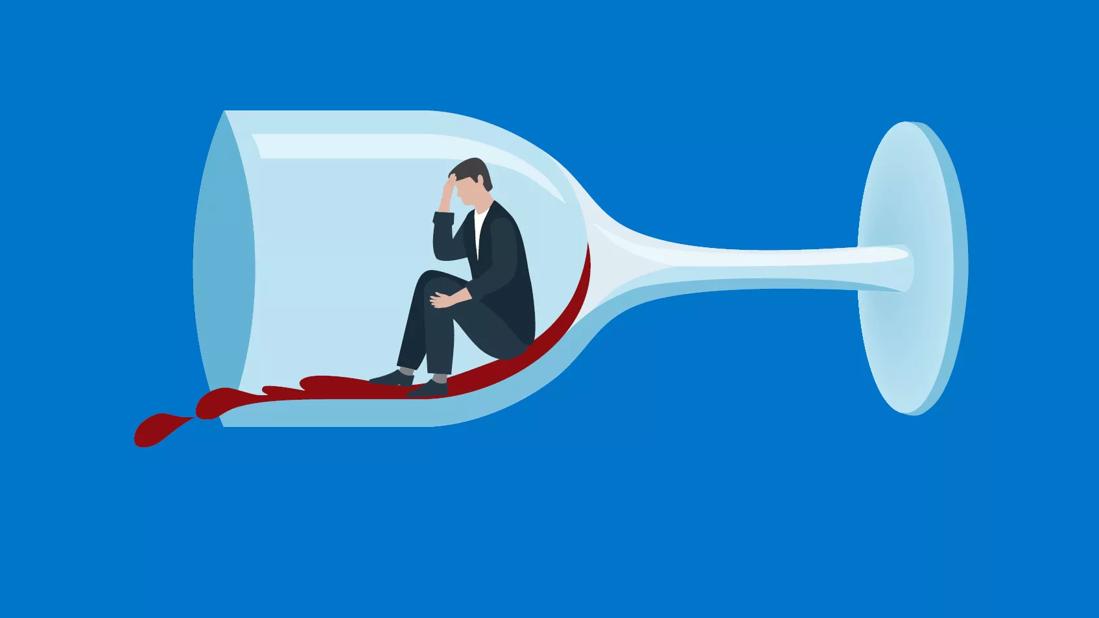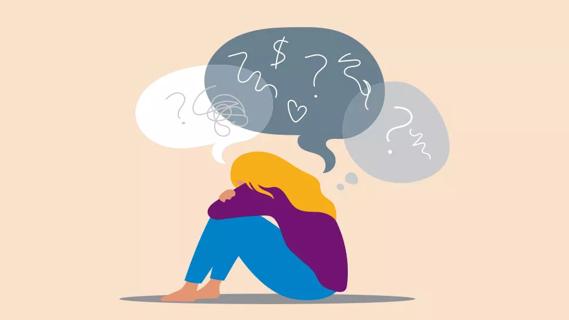Drinking can make you anxious or jittery

Do you ever notice yourself feeling a little out of sorts the day after you drink? Not a hangover, necessarily, but a general jittery malaise? Anxiety seems to be a bedfellow of alcohol — and for many reasons.
Advertisement
Cleveland Clinic is a non-profit academic medical center. Advertising on our site helps support our mission. We do not endorse non-Cleveland Clinic products or services. Policy
Chemical dependency specialist Joseph Janesz, PhD, LICDC, says there are various ways that anxiety and alcohol are linked, so it’s important to understand how alcohol affects not only your body, but also your mind.
A night of drinking can bring up feelings of anxiety or jitteriness, even if you’re not diagnosed with an anxiety disorder. But why is this? Alcohol affects the levels of serotonin and other chemicals in your brain, so it affects your body and mind in various ways the next day.
Drinking can also cause hangovers, which usually consist of symptoms like nausea, dizziness and headaches. But there can also be a feeling of anxiety and panic the next day.
Here are some ways that alcohol impacts your system, which can lead you to feel anxious after a night of drinking:
Even if you’re consuming a standard amount of alcohol — a 12-ounce beer or a 5-ounce glass of wine — you’ll experience a mild detox or withdrawal. It takes your body and liver about eight hours to remove what’s essentially a poison. As this is happening, it can affect your central nervous system and cause you to feel jittery or anxious.
Even one drink can interrupt the natural cycles of sleep, causing a nervous or irritable feeling the next morning. Alcohol is a mild anesthesia and will put you in the mood for sleep — at least initially. Later in the sleep stages, alcohol disrupts REM sleep and paralytic sleep, which is when your body rejuvenates itself. You’re often just not as rested the next day.
Advertisement
Alcohol depletes folic acid, particularly in women (Side note: When women are low in this mineral, they’re more at risk for breast cancer). There’s also a preliminary belief that lower levels of folic acid can alter your mood and cause feelings of depression and anxiety.
When you drink, do you couple this with eating pretzels, pizza or sweets? We tend to pair up our vices, and not only drink alcohol but also eat highly dense, problematic foods. Your body can have an uncomfortable sensation the next day as a result, which can feel like a nervous energy or anxiety.
Many people don’t realize how dehydration can cause anxiety. Let’s say you drink a beer and martini but you don’t drink any water in between. You can wake up with a dry mouth and feeling out of sorts. Alcohol is a diuretic, meaning it makes you lose water through peeing, so it’s very important to drink plenty of water as well when you’re drinking alcohol. Try to drink a glass of water between alcoholic drinks.
Alcohol is a natural disinhibitor — meaning it can cause you to make choices you may not make while sober. This is why some people can wake up feeling embarrassed about things they said or did. This can definitely cause anxiety and worsen any existing phobias or overthinking tendencies you may already have.
“I’ve had patients who have shared feeling mortified because of oversharing with a spouse’s boss or fighting with a partner in a way that they never normally would,” says Dr. Janesz. “For this to happen, you don’t even need to drink a lot. Even a little bit of alcohol can tip the scales.”
Few people may realize it, but you can actually be allergic or intolerant to alcohol. Anywhere from 7% to 10% of the general population has such an allergy, though it affects about 35% of those with Asian backgrounds. Signs include skin flushes and a feeling of being either wound up or very sleepy. Mood changes and anxiety often follow.
For some people, your anxiety actually comes before alcohol. About 3.1% of the U.S. population is affected by generalized anxiety disorder, according to the Anxiety & Depression Association of America. If you’re feeling nervous about being in a social setting, you may pour yourself a glass of wine to self-regulate any stress.
It makes sense why people reach for a drink as a stress reliever. As alcohol is a sedative and depressant, it can relieve feelings of fear and anxiety in the moment. But after the alcohol wears off, you can start to feel your anxiety come back even stronger. This can become a cycle where you become dependent on alcohol.
Advertisement
If your body becomes used to consuming alcohol as a coping mechanism, you may experience symptoms of withdrawal when you’re not drinking. This included increased anxiety, as well as:
If you take medication for anxiety, or you take anti-inflammatory drugs or narcotics, drinking can cause problems with anxiety. You can become agitated and jittery because your body is busy processing the alcohol, which neutralizes the effect of these medications.
It’s important to pay close attention to the labels on your drug bottles and not to drink alcohol if you read a warning
If you’re feeling overwhelmed by your anxiety disorder, there are other ways to seek help. If you have a history of anxiety or mental disorders, make sure to share this with your healthcare provider so you know how alcohol or other substances may affect you differently.
In addition, if you’re noticing your anxiety levels increasing after drinking, try cutting down on how much you drink. Plus, take note of how your mood is each day — if you’re feeling extra on edge already, try and go against the temptation of remedying that with alcohol. Try some other ways to calm your anxious thoughts instead.
Advertisement

Sign up for our Health Essentials emails for expert guidance on nutrition, fitness, sleep, skin care and more.
Learn more about our editorial process.
Advertisement

Going home isn’t always easy, but there are ways to ease any stress you might feel

Managing stress can help you sleep more soundly

This fast-acting anxiety medication should never be taken with alcohol, despite what you may see on The White Lotus

Deep breathing, positive mantras and tackling negative thoughts can help get you out of your head and cool down your anxiety

Focusing on what you can see, feel, touch and hear can help you feel more present in the moment

Performance anxiety and stage fright are outsized stress responses that can creep up when you’re put on the spot

A healthy amount of anxiety can keep you safe from harm and motivate you to take action

Although different conditions, they can occur together or cause one another

Even small moments of time outdoors can help reduce stress, boost mood and restore a sense of calm

A correct prescription helps your eyes see clearly — but as natural changes occur, you may need stronger or different eyeglasses

Both are medical emergencies, but they are very distinct events with different causes